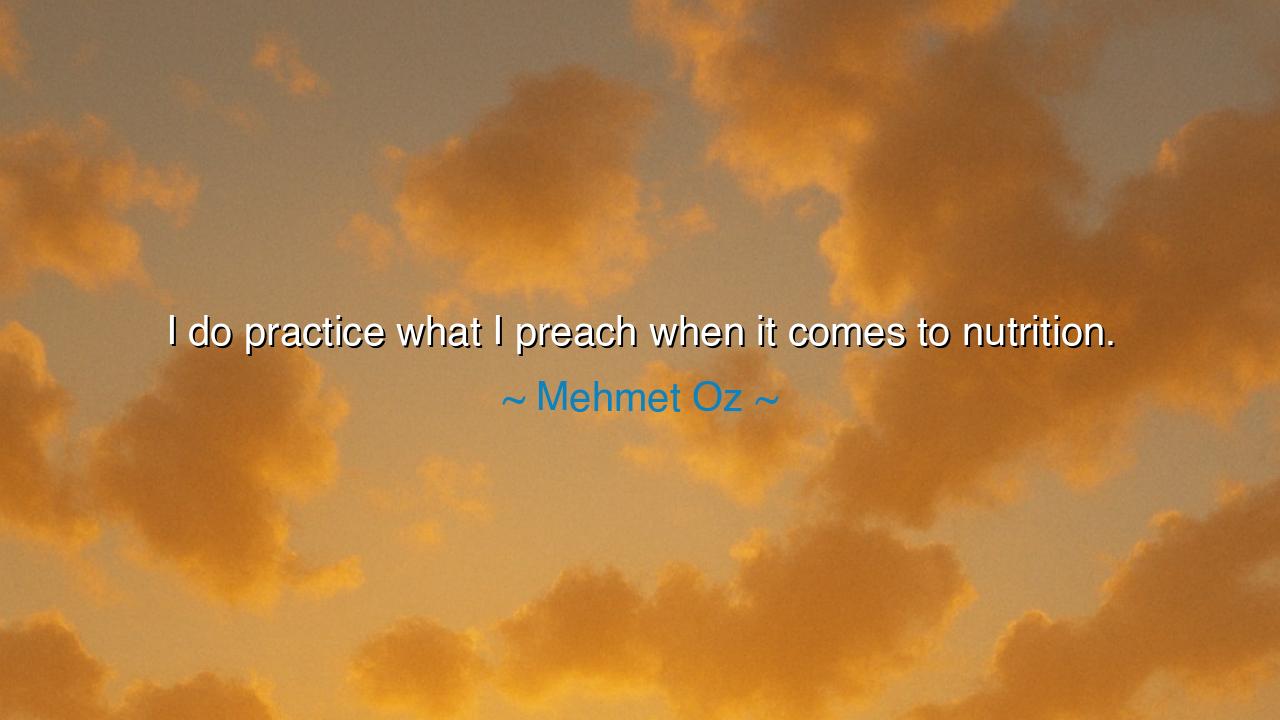
I do practice what I preach when it comes to nutrition.






In the words of Mehmet Oz, “I do practice what I preach when it comes to nutrition,” we hear not only the declaration of a man of science, but the vow of one who seeks integrity between word and deed. His statement, though plain, carries the gravity of an ancient principle — that true wisdom is not measured by what one says, but by what one embodies. In this, his words echo the voice of the philosophers, the prophets, and the physicians of old, who taught that knowledge divorced from action is barren, but knowledge lived out becomes virtue.
To “practice what I preach” is to live in harmony between belief and behavior, between the tongue and the heart, between teaching and living. The ancients called this alignment areté — excellence of the soul, the pursuit of integrity that turns wisdom into strength. A man may speak of health, but if he neglects his own body, his words ring hollow. A man may preach moderation, yet indulge in excess; he becomes a hypocrite before his own conscience. But the one who aligns his life with his teaching becomes a living testimony. His words carry power because they spring from truth, not pretense. Mehmet Oz, in affirming that he practices what he teaches, invokes this timeless code — that the healer must first heal himself, the teacher must first learn, and the guide must first walk the path he shows to others.
This principle can be traced back to Hippocrates, the father of medicine, who taught that “a physician without self-discipline is a danger to himself and his patients.” Hippocrates did not heal by words alone; he lived the balance he prescribed, eating simply, resting wisely, and living in harmony with nature. For him, the doctor was not merely one who treated disease, but one who embodied health. Oz’s words echo this heritage — for to speak of nutrition, of food as medicine, is to uphold the same lineage of wisdom: that nourishment is sacred, that the healer’s example must illuminate his teachings.
Consider the tale of Epictetus, the Stoic philosopher born into slavery, who taught that philosophy is not a matter of speech, but of living rightly. When a student asked him why he did not indulge in pleasures since he spoke so often of virtue, Epictetus replied, “Would you trust a ship captain who has never sailed, or a physician who has never been sick?” His life itself was his doctrine — austere yet content, disciplined yet joyful. Like Oz, he lived his beliefs, understanding that example is the most powerful form of persuasion. Words fade like wind, but deeds endure like stone.
When Oz says he practices what he preaches “when it comes to nutrition,” he points to one of the great pillars of life — the sustenance of the body, which in turn sustains the spirit. Nutrition, in his creed, is not merely the science of eating, but the art of honoring the vessel that carries the soul. The ancients, too, viewed food as divine — the Egyptians offered grain to the gods; the Greeks saw bread and olive oil as symbols of life and purity. To eat consciously is to recognize that health is not a passive gift, but a covenant between man and nature. Thus, to live by one’s own teachings in this realm is to participate in the sacred rhythm of creation.
There is also humility in his statement — a quiet acknowledgement that one’s teachings mean nothing if they are not lived. Integrity demands effort, and practice demands vigilance. The wise do not separate personal life from their message; rather, they weave them into one tapestry. The philosopher Confucius taught that the superior man is like a bell: his sound is pure because his metal is consistent. So too is the life of one who practices what he preaches — his words resonate, not because they are loud, but because they are true.
Let this be the lesson carried forward: live your wisdom. Do not speak of health and neglect your body; do not preach kindness and harbor bitterness; do not teach truth and live in falsehood. The power of any teaching lies not in its beauty, but in its embodiment. The ancients bowed before those whose lives reflected their words, for such people became beacons — guides who taught without commanding. If you would lead others to light, begin by kindling it within yourself.
Thus, the wisdom of Mehmet Oz endures beyond medicine — it is a call to authenticity. To practice what one preaches is to live as a whole being, unified in thought, speech, and action. To live with such integrity is to honor not only the body, but the divine within it. For the one who aligns his words with his deeds becomes more than a teacher — he becomes a mirror of truth, a living example of the harmony that the ancients called the highest form of wisdom: to live as one believes, and to believe as one lives.






AAdministratorAdministrator
Welcome, honored guests. Please leave a comment, we will respond soon